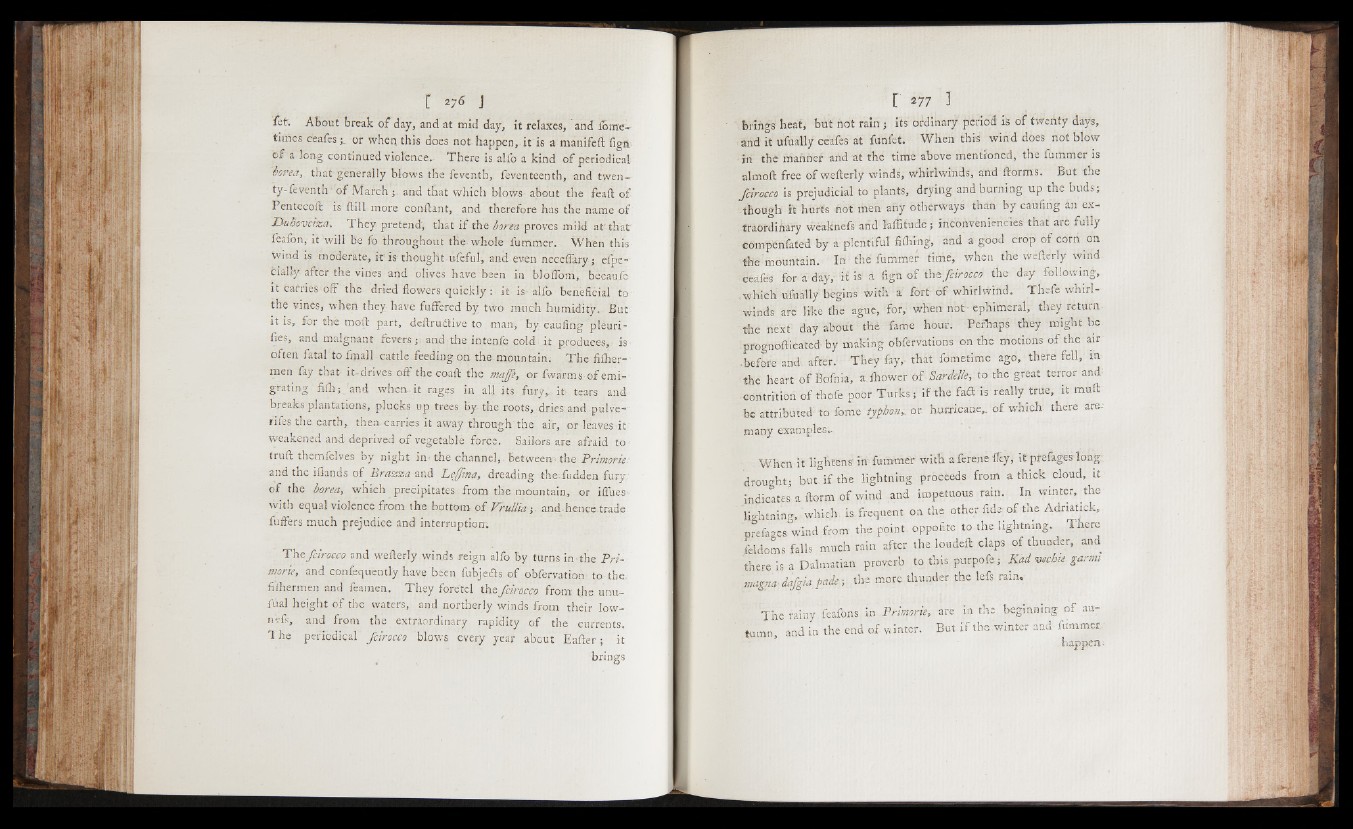
let. About break o f day, and at mid day, it relaxes, and fome--
times ceafes ; or when this does not happen,-it is a manifeft fign
o f a-long continued violence. There is alfo a kind o f periodical
borea, that generally blows the feventh, feventeenth, and twen-
ty-foventh 1 o f March ;. and that which blows about the feaft of
Pentecoft is ftill more confiant-, and therefore has the name of
D-uBovciza. They pretend, that i f the borea proves mild at that
feafon, it will be fo throughout the-whole furnmer. When this
wind is moderate, i t is- thought rifeful, and even neceflary-; efpe-
cially- after the vines and olives have been in bioïTom, becaufe
it carries off the dried flowers quickly it is- alio beneficial to-
the vines, when they have differed by two much humidity. But
it is, for the tnoii part, deftruéïive to mans by caufing pleuri-
des, and malgnant fevers and the intenfe cold- it produces, is-
often fatal to fmall cattle feeding on the mountain. The filher-
men fay that it-drives off the c-oaft the ntcijji, or fwarms-of emi--
grating fi-ih; and when-.it rages in all its fury, it tears and
breaks plantations, plucks up trees by the roots, dries and pulve-
riles the. earth,, then-carries it away through’ the air, or leaves-it
weakened and deprived o f vegetable force. Sailors are afraid to ■
truft themfelves by night in- the channel, between; the Primorie:-
and the iilands of Hrazza and Pefjina, dreading t-he-fudden fury.'
o f the borea, which precipitates from the mountain, or iffues-
with equal violence from the bottom o f Vrullia ; and-hence trade
differs much prejudice and interruption;
Thefcirocco and wefterly winds reign alfo by turns in-the P ri-
morie, and confequently have been fubjefts o f obfervation to-the.
filhermen and feamen. They foretel the fcirocco from, the unu-
frial height o f the waters, arid northerly winds from their low-
nefs, and from the extraordinary rapidity o f the currents.
1 he periodical fcirocco blows every year about Eafter ; it
brings
brings heat, but not rain ; its ordinary period is of twenty days,
and it ufually ceafes at funfet. When this wind does not blow
in the manrief arid at the time above mentioned, the dimmer is
almoft free o f wefterly winds, whirlwinds, arid ftorms. But the
fcirocco is prejudicial to plants, drying and burning up the buds;
though it hurts riot men- ariy otherways than by caufing an extraordinary
weaknefs arid laflitude; inconveniencies that are fully
Comperiiated by a plentiful filhing, and a-good crop of corn on
the "mountain. In the dimmer time, when the Wefterly wind
ceafes fo r * d a y , - « i f a dgn o f t h fcirocco the day following,
.which ufually begins with a' fort o f whirlwind. Thefe whirlwinds
are like the ague, for, when not- ephimeral, they return,
the next1 day about the fame hour. Perhaps they might be-
prognofticated by making obfervations on the motions o f the air
-before and- after. They fay,- that fometime ago, there fell, in
the heart o f Bofnia, a.ihower o i Sardellei to the great terror and
contrition of thofe poor Turks; i f the faft is really true, it mull
be attributed- to fome typhon,. or. hurricane,, o f which- there are;
many examples;.
When-it-lightens’ in'furnmer with afereneiky, it prefageslong:
drought; but i f the lightning proceeds from a thick cloud, it
indicates a ftorm .of wind and impetuous rain. In winter, the
lightnino-, which, is. frequent on the other-fide of the Adnatick,
prefages'wind from the point, oppofite to the lightning. There
feldoms falls much rain after the loudeft claps of thunder, and
there is a Dalmatian proverb to this purpofe; Kad veche garmt
magna' dafgia fa d e; the more thunder the lefs ram.
The rainy feafons in Primorie, are in the beginning of autumn,
and in the end o f winter. But i f the.winter and- dimmer.
happen;